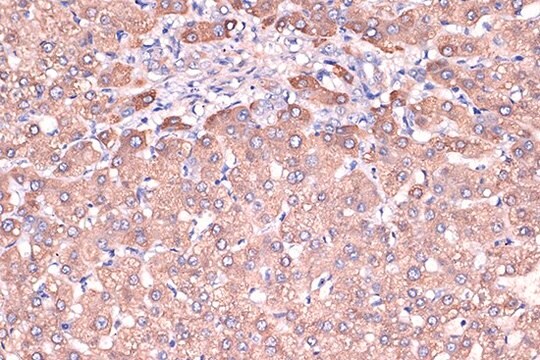JV-10L-BK
Anti-D (clone RUM-1), FFMU
Anti-D from the clone RUM-1, Human IgM, Intermediate for further manufacturing use
Iniciar sesiónpara Ver la Fijación de precios por contrato y de la organización
About This Item
UNSPSC Code:
41116102
NACRES:
NA.41
Productos recomendados
biological source
human
Quality Level
antibody form
unpurified
clone
RUM-1, monoclonal
form
liquid
packaging
pack of 10 L
concentration
0.5-10 mg/mL protein (Total Protein Range)
technique(s)
agglutination assay: suitable
pH
6.7-7.7
isotype
IgM
shipped in
ambient
storage temp.
2-8°C
General description
Standardized, concentrated cell culture supernatant which has been diafiltered with phosphate buffered saline.
For the formulation of Anti-D blood typing reagents or devices.
RUM-1 is the most avid of the four EMD Millipore IgM Anti-D FFMU intermediates. The fine specificity of this antibody is ideal for the manufacture of an IgM only Anti-D reagent for typing patient samples. RUM-1 is the international Anti-D standard assigned by the World Health Organisation (WHO).
Contains 0.1% (w/v) Sodium Azide; Shelf Life: 24 months from date of filtration.
For the formulation of Anti-D blood typing reagents or devices.
RUM-1 is the most avid of the four EMD Millipore IgM Anti-D FFMU intermediates. The fine specificity of this antibody is ideal for the manufacture of an IgM only Anti-D reagent for typing patient samples. RUM-1 is the international Anti-D standard assigned by the World Health Organisation (WHO).
Contains 0.1% (w/v) Sodium Azide; Shelf Life: 24 months from date of filtration.
Application
Antibody intermediate for further manufacturing use.
Production of an in vitro blood typing product or device.
Disclaimer
Partially processed reagent for further manufacture of non-injectable products only. The absence of all viral antigens has not been determined. No US Standard of Potency. Do not use if turbid. Contains 0.1%<nbsp/>(w/v) sodium azide.
Storage Class
10 - Combustible liquids
wgk_germany
WGK 1
Certificados de análisis (COA)
Busque Certificados de análisis (COA) introduciendo el número de lote del producto. Los números de lote se encuentran en la etiqueta del producto después de las palabras «Lot» o «Batch»
¿Ya tiene este producto?
Encuentre la documentación para los productos que ha comprado recientemente en la Biblioteca de documentos.
Nuestro equipo de científicos tiene experiencia en todas las áreas de investigación: Ciencias de la vida, Ciencia de los materiales, Síntesis química, Cromatografía, Analítica y muchas otras.
Póngase en contacto con el Servicio técnico






